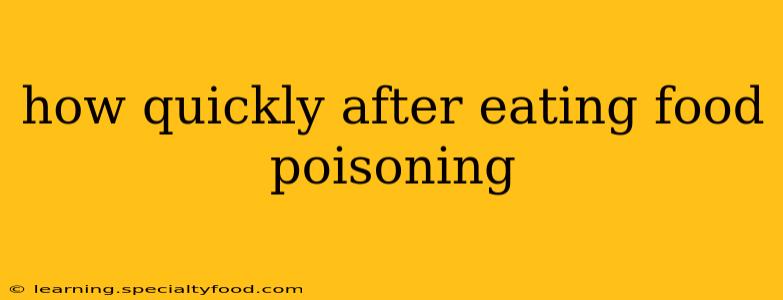How Quickly After Eating Do Food Poisoning Symptoms Appear?
Food poisoning, or foodborne illness, can manifest in a variety of ways and at different speeds depending on several factors. There's no single answer to how quickly symptoms appear after eating contaminated food, as the incubation period—the time between ingestion and symptom onset—varies greatly depending on the type of pathogen involved. Understanding this variability is crucial for both recognizing food poisoning and seeking appropriate medical care.
What are the common symptoms of food poisoning?
Before diving into timing, it's important to understand the common symptoms. These can include:
- Nausea and vomiting: Often one of the first signs.
- Diarrhea: Can range from mild to severe.
- Stomach cramps and pain: A common and often debilitating symptom.
- Fever: While not always present, a fever can indicate a more serious infection.
- Headache: Can accompany other symptoms.
- Chills: Feeling cold and shivering.
- Muscle aches: General body aches and pains.
- Dehydration: Caused by vomiting and diarrhea; can be a serious complication.
How soon after eating contaminated food do symptoms usually start?
The incubation period for food poisoning can range from a few hours to several days. This significant variation depends heavily on the specific bacteria, virus, or parasite responsible for the illness. Here are some examples:
-
Staphylococcus aureus (Staph): Symptoms typically appear within 30 minutes to 6 hours after consuming contaminated food. This is a relatively short incubation period.
-
Salmonella: Symptoms usually begin between 6 hours and 6 days after eating contaminated food, with an average of 12 to 72 hours.
-
Campylobacter: The incubation period for Campylobacter is typically 2 to 5 days.
-
E. coli: Symptoms can appear within 1 to 10 days, with an average of 3 to 4 days. The severity can vary widely.
-
Norovirus: This highly contagious virus usually has a very short incubation period of 12 to 48 hours.
What factors affect the incubation period?
Several factors can influence how quickly symptoms develop:
-
Type of pathogen: As outlined above, different pathogens have different incubation periods.
-
Amount of contaminated food consumed: A larger amount of contaminated food may lead to a quicker onset of symptoms.
-
Individual's immune system: A person with a weaker immune system may experience symptoms sooner or more severely.
-
Strain of pathogen: Even within the same type of bacteria or virus, different strains can have varying incubation periods and severities.
When should I seek medical attention for food poisoning?
While many cases of food poisoning resolve on their own within a few days, it's crucial to seek medical attention if you experience:
- Severe dehydration: Signs include dizziness, lightheadedness, and decreased urination.
- High fever (over 101.5°F or 38.6°C): This can indicate a more serious infection.
- Bloody diarrhea: This can be a sign of a serious infection.
- Persistent vomiting: Inability to keep down fluids can lead to dehydration.
- Symptoms lasting longer than a few days: Prolonged symptoms may require medical intervention.
- Signs of shock: Such as rapid pulse, low blood pressure, and confusion.
How can I prevent food poisoning?
Practicing safe food handling techniques is crucial in preventing foodborne illnesses. This includes:
- Thorough handwashing: Wash your hands frequently, especially before and after handling food.
- Proper food storage: Refrigerate perishable foods promptly.
- Cooking to safe temperatures: Use a food thermometer to ensure meat and poultry are cooked to the correct internal temperature.
- Avoiding cross-contamination: Don't let raw meat juices drip onto other foods.
- Washing fruits and vegetables: Thoroughly wash produce before consumption.
Remember, this information is for general knowledge and does not constitute medical advice. If you suspect you have food poisoning, consult a healthcare professional for accurate diagnosis and treatment. They can assess your specific situation and provide the best course of action.
